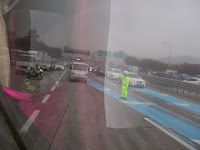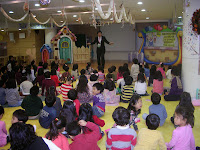In the evening today, all of the North American delegates met together. There were representatives from the Anglican Church, the Roman Catholic Church, various Protestant and Orthodox churches, and the Society of Friends (Quakers). A Canadian - me - and an American were asked to present our reflections on the theme as an introduction to conversations in small groups. Here is what I said.
Most of you don’t know very much about me. You know that my name is Laura, I’m from Canada, I’m Presbyterian.
So I wanted to start today by telling you something else about me. I figured that would be a good place to begin – we can get to know each other a bit better.
So... I can be a tad indecisive sometimes. Most of the time I’m okay, but if you catch me at the wrong moment, deciding what I’m going to wear today or what I’m going to eat for dinner can be a bit much. Making a big decision always takes a lot of thought and reflection.
As you might expect, I have some strategies I use that help me to make decisions.
- I pray
- I make pros and cons lists
- I think about my priorities and which choice lines up most closely with those
- Sometimes I will try to fool myself into thinking that I’ve picked one of the options for a day just to see how that choice sits with me.
- My now husband even bought me one of those magic 8 balls early on in our relationship.
To be completely honest with you, this is what I thought about when I was reflecting on the theme before us this week. This prayer is another tool for me to consider when making decisions.
God of life, lead me to justice and peace. When I have two (or more) choices before me, God, lead me toward the one that will foster justice and peace in your world.
I thought about other decisions that are made every day too.
For my job with the Government of Canada, I spend much of my days watching parliamentary debates in Canada’s House of Commons and Senate. I wonder how many of our parliamentarians wake up each day thinking about how their decisions for Canada and for the people of Canada could lead us, as a country, toward justice & peace.
And of course, I think of the church. I think of my home congregation, St. Andrew’s Presbyterian in Ottawa. I think of The Presbyterian Church in Canada. I think of Christ’s church around the world. How are we asking God to help us make decisions that lead us to justice and peace?
This is a very concrete, tangible thing for me. I see it as a question of the church’s place in the world.
It is not only how we are seeking God’s help in leading us to justice and peace, but how are we serving as an example for the rest of the world?
The decisions we make as a church – are we demonstrating what the path to justice and peace looks like for those outside of the church?
I think of the relationship in Canada between the church and Canada’s first peoples. After a difficult history of assimilation in residential schools that took Aboriginal children away from their families, churches apologized, asking forgiveness from God and from the Aboriginal people who were so hurt by these policies.
Truth and reconciliation commissions across Canada are being held to hear the important stories of those who were profoundly hurt by the churches’ actions in these schools.
It took us some time to get on the path to peace and justice. We have come a long way in working toward right relationship with Aboriginal people in Canada, but we must continue to pray and to act.
God of life, lead us to justice and peace.
I think of the Aboriginal women in Canada who have gone missing or have been murdered. An astonishingly high number. A national disgrace that is not being addressed by those in power.
At a vigil I attended a few weeks ago, on the steps of Canada’s Parliament, the sister of a woman who had been murdered thanked us for being there.
“Thank you for coming,” she said. “Sometimes it feels like no one cares.”
What can the church do in this case? How can we be led to justice and peace, and how can we encourage others to join us on that path?
I pray that our meetings here, that our discussions together, that our worship will invigorate and encourage us so that we continue praying, when we return home to all kinds of circumstances:
God of life, lead us to justice and peace.















.JPG)










